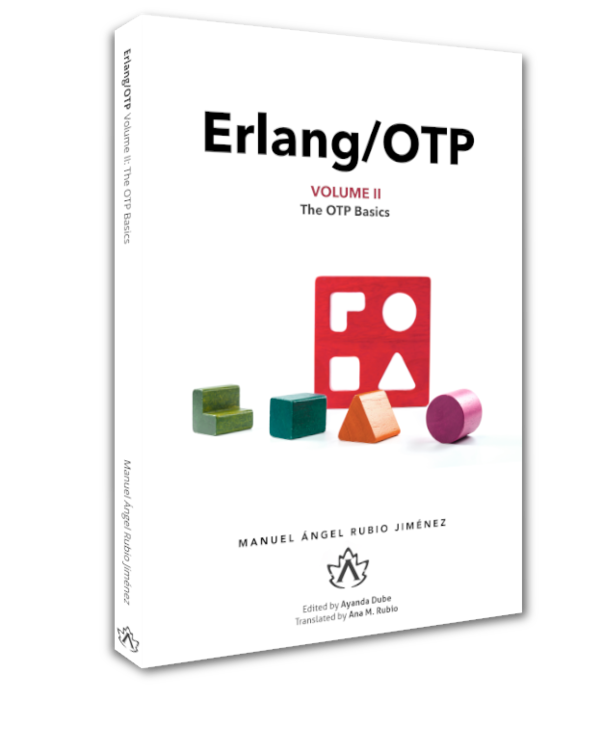
Muestras para leer
Comprueba la lengüeta de contenido para obtener más información del libro. Aquí puedes ver algunos extractos:
Erlang/OTP Volume II
The OTP Basics
The OTP basics...
After the first volume and knowing what we can do with Erlang it's the OTP turn. The OTP framework is available in Erlang and contains the necessary base for complete and professional application development in Erlang.
In this volume, we will see all of the OTP behaviors, typing, and Dialyzer, and through the book, we will be building several projects.
"The successful construction of all machinery depends on the perfection of the tools employed, and whoever is a master in the arts of tool-making possesses the key to the construction of all machines. Charles Babbage
| ISBN | 978-84-945523-8-0 |
|---|---|
| Número de páginas | 271 |
| Autor | Manuel Ángel Rubio Jiménez |
| Editor | Ayanda Dube |
| Traductor/a | Ana María Rubio Jiménez |
| Idioma |
 (EN)
(EN)
|
| Fecha de publicación | noviembre de 2023 |
| Edición | (1ª) Primera edición |
-
Introduction
preparado
About the authors, the book, the volumes, nomenclature, and acknowledges.
-
Type Specifications
extracto
preparado
A way to obtain type checking and the Dialyzer validation for the code quality, checking issues, and improvements.
-
Concurrency Oriented Programming
preparado
From Object Oriented Programming until the Actor Model, we will see how Erlang use the concurrency and the features applied to OTP.
-
Behaviours
preparado
Defining behaviours to be implemented in Erlang. From scratch to understand how OTP was built and how it works.
-
Creating Servers
preparado
Defining the minimal unit of programming for OTP: the server. We will explore all of the gen_server possibilities through 3 examples.
-
State Machines
extracto
preparado
We advance and increase our knowledge with the Mealy State Machines. We will check 3 more examples to understand how gen_statem works.
-
Event Handlers
preparado
The event handling in Erlang/OTP is made for handling alerts and alarms mainly but also to broadcast events to be processed by different modules. In this chapter we will see how to build these event handlers with 3 examples and we will see how alarm_handler is working.
-
Supervising Processes
preparado
We will check the supervisor's behavior completely using 4 examples to explore all of the possibilities the supervisor could give us.
-
Creating an Application
preparado
We create 3 example applications in this chapter. We will explore all of the previous concepts together (supervisor, servers, state machines), and we create the applications using these concepts. In addition, we will see how dependencies, the included applications, versioning, and configuration works.
-
Distribution
preparado
Using the capabilities of the kernel application we will build high availability systems. We will also explore the group of processes (pg), and containers (pool) to design and run distributed systems.
-
Logs with logger
preparado
Do you know how the logs are working in Erlang? We will answer this and other questions regarding logger. The goal of this chapter is give you the knowledge about how logger works and how to take advantage of its features.
-
Releases
preparado
We finish our travel through OTP framework checking how to perform releases. We will see how to create packages with all of the applications we need to run our development and how to use relx and rebar3 for these tasks.
-
Erlang Documentation: EDoc
preparado
A summary and recipe about how to create documentation for the Erlang modules using the rich comments.
-
Command-line: Dialyzer
preparado
A small guide about how to use Dialyzer in the command-line. We review the parameters to use with the command, how to generate the PLT files and common errors you can get and how to solve them.
-
Command-line: erl
preparado
A bit of help to use the command line with erl. It's short but plenty of tricks about optimizations and parameters definition.
Autores

Formatos disponibles
Digital
15,00 €
